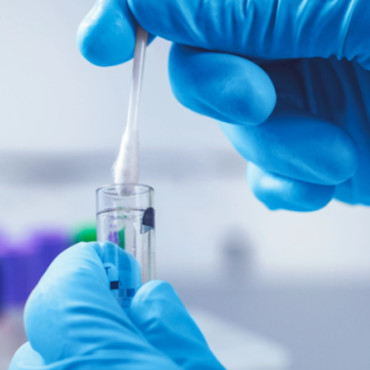The working principle and process of PCR technology
What is PCR?
PCR is a very sensitive technique that can rapidly amplify specific DNA fragments. PCR produces billions of copies of a specific DNA segment or gene, which allows the detection and identification of gene sequences using size- and charge-based visual techniques.
Basic principles of PCR technology
The basic principle of PCR technology is similar to the natural replication process of DNA, and its specificity depends on oligonucleotide primers complementary to both ends of the target sequence. PCR consists of three basic reaction steps: denaturation-annealing-extension:
1. Denaturation of template DNA: After the template DNA is heated to about 93°C for a certain period of time, the double-stranded DNA of the template DNA or the double-stranded DNA formed by PCR amplification is dissociated to make it single-stranded so that it can be combined with the primer. Prepare for the next round of reactions;
2. Annealing (renaturation) between the template DNA and the primer: After the template DNA is denatured into a single strand by heating, the temperature is lowered to about 55°C, and the primer is paired with the complementary sequence of the template DNA single strand;
3. Primer extension: The DNA template-primer conjugate is at 72°C under the action of DNA polymerase (such as TaqDNA polymerase), using dNTP as the reaction raw material and the target sequence as the template, according to the principle of base complementary pairing and semi-reserved replication. , synthesize a new semi-retained replication strand complementary to the template DNA strand, and repeat the three-cycle process of denaturation-annealing-extension to obtain more "semi-retained replication strands", and this new strand can become the next cycle. template. It takes 2 to 4 minutes to complete a cycle, and the amplification of the target gene to be amplified can be amplified several million times in 2 to 3 hours.

The standard PCR process is divided into three steps:
1. DNA denaturation: (90°C-96°C): the double-stranded DNA template breaks hydrogen bonds under the action of heat to form single-stranded DNA
2. Annealing: (60℃-65℃): The temperature of the system decreases, and the primers bind to the DNA template to form a local double-strand.
3. Extension: (70°C-75°C): Under the action of Taq enzyme (at around 72°C, the best activity), using dNTP as raw material, start from the 3' end of the primer and start from the 5'→3' end of the primer. extension, synthesizing a DNA strand complementary to the template.
Each cycle of denaturation, annealing, and extension doubles the DNA content. Some PCRs can be replicated in a very short time even if the Taq enzyme activity is not optimal because the amplification region is very short, so it can be changed to a two-step method, that is, annealing and extension are carried out at the same time between 60 °C and 65 °C, so that Reduce a heating and cooling process, improve the reaction speed.
Professional manufacturer of Nucleic Acid (DNA & RNA) Extraction and Analysis products supplier
GENETURE is a group company,we own two factories: Ascend and Dianrun,to provide one stop solution of Nucleic Acid Extraction and Analysis,including solution for COVID-19. Geneture provides high quality and professional Nucleic Acid Extraction Reagents, Lab consumables, Real-time PCR consumables and test machines.
GENETURE main products including: Nucleic acid extraction or purification kit,Automatic nucleic acid extractor, PCR system, PCR kit, Magnetic beads, and lab consumables of 96 well deep plate,Magnetic rod comb,PCR tube,PCR plate,Pipette tips,centrifuge tubes.
Geneture's PCR amplification systems feature the latest technological advances, providing greater accuracy and reproducibility in nucleic acid amplification for genomic experiments. Product lines include real-time PCR systems, PCR reagents, and plastic products (PCR plates and PCR tubes). If you have any questions about PCR, feel free to contact us.
Email: info@geneture.com
Mobile: +86 150 1002 8687
- SKU: Jessica
- Category: News
Additional Information
Send an Inquiry
Your email address will not published. Required fieled are marked.
Related Products
Check out other related DNA/RNA Extraction Products
